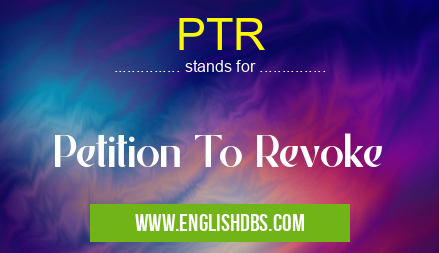What does PTR mean in UNCLASSIFIED
A Petition To Revoke (PTR) is a formal request to a court or other relevant authority to cancel or modify a previously granted privilege, such as probation, parole, or a suspended sentence. This petition is typically filed by a probation or parole officer, prosecutor, or other interested party who believes that the individual in question has violated the terms of their release.

PTR meaning in Unclassified in Miscellaneous
PTR mostly used in an acronym Unclassified in Category Miscellaneous that means Petition To Revoke
Shorthand: PTR,
Full Form: Petition To Revoke
For more information of "Petition To Revoke", see the section below.
Purpose of a PTR
The primary purpose of a PTR is to address violations of probation or parole conditions. These violations can range from minor infractions to serious criminal offenses. When a violation occurs, the probation or parole officer may file a PTR to revoke the individual's release and return them to custody.
Process of Filing a PTR
The process of filing a PTR typically involves the following steps:
- Gathering evidence of the alleged violation
- Preparing a formal petition outlining the grounds for revocation
- Submitting the petition to the relevant authority
- Holding a hearing to determine if the violation occurred and if revocation is warranted
Consequences of a Successful PTR
If a PTR is successful, the court or authority may revoke the individual's probation or parole and order them to serve their remaining sentence in prison or jail. In some cases, the court may also impose additional sanctions, such as fines or community service.
Essential Questions and Answers on Petition To Revoke in "MISCELLANEOUS»UNFILED"
What is a Petition To Revoke (PTR)?
A Petition To Revoke (PTR) is a legal document filed with the court to request the revocation of a probation, parole, or conditional release. It is typically filed by the probation or parole officer or by the prosecution.
What are the grounds for filing a PTR?
The most common grounds for filing a PTR include a violation of the terms of probation or parole, such as committing a new crime, failing to report to the probation or parole officer, or testing positive for drugs or alcohol.
What happens after a PTR is filed?
Once a PTR is filed, the court will schedule a hearing to determine if there is probable cause to believe that the probationer or parolee has violated the terms of their release. If the court finds probable cause, a formal revocation hearing will be scheduled.
What are the consequences of having probation or parole revoked?
If the court revokes probation or parole, the individual will be sentenced to serve the remainder of their original sentence in jail or prison.
Can I challenge a PTR?
Yes, you can challenge a PTR by filing a motion to dismiss or by presenting evidence at the revocation hearing. You have the right to be represented by an attorney at both the probable cause hearing and the revocation hearing.
What is the difference between a PTR and a Violation of Probation (VOP)?
A VOP is a less formal proceeding than a PTR. It is typically filed when the probationer or parolee has committed a minor violation of the terms of their release. A VOP does not result in the revocation of probation or parole, but the court may impose additional conditions or sanctions.
Final Words: A PTR is a legal mechanism used to address violations of probation or parole conditions. By revoking an individual's release, the court can ensure that they are held accountable for their actions and provide a measure of public safety. It is important to note that the process of filing and granting a PTR is a complex and serious matter that requires careful consideration of all relevant factors.
PTR also stands for: |
|
| All stands for PTR |
